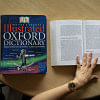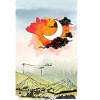Won-Pyung Sohn’s ‘Almond’: A story of loveable monsters

Won-Pyung Sohn's Almond (HarperVia, 2021), translated to English by Sandy Josun Lee, is a mesmerizing novel that captures the heart of a reader indelibly. Fifteen-year-old Yunjae cannot feel emotions due to alexithymia and is deemed a monster by others. Feelings such as love and empathy are mere words to him. At the age of six he sees a child gang-beaten to death by other children. More than a decade later, he watches a man stab his grandmother and hammer his mother into a comatose state, without batting an eyelid. At school he is tormented and at home, he becomes aware of an ever-growing void due to the absence of a loving family, but nothing can penetrate his heart. His lonely days pass in nonchalance until one day an unusual request from a stranger ends up connecting him with another 'monster' named Gon.
Gon is the new transfer student in Yunjae's class. He is a violent and livid teen with a tragic past, ostracized and resented by all. Lost and separated from his well-to-do family at a very young age, he lived a life of abject poverty, abandonment, and violence for 13 years. He is finally returned to his rightful home but it too lacks warmth. His mother died before they could meet and his father is ashamed of him. Furthermore, due to his father's actions, he begins to resent Yunjae and violently attacks him at school. Yet, through turns of events an unlikely friendship forms between the two that enable both to find salvation.
A fascinating aspect of Almond is its vivid portrayal of the protagonists and the stigmatized society they live in. Yunjae and Gon are mirror-images of each other in every possible way. One can recognise love but not feel it, whereas the other is desperate to feel loved but cannot find it. One can express himself eloquently but knows not the value of words whereas the other is desperate to convey his feelings but unable to do so with his severely limited vocabulary. This is a powerful book that heart-wrenchingly depicts the necessity of love in a child's life. The presence and absence of love can be the making or breaking of a child and for every child, it is love that comes first rather than wealth, power or even societal acceptance.
The world of Yunjae and Gon is a brutal one, people are quick to judge but slow to understand or sympathise. They refuse to recognise the two boys as children and choose to blame, taunt, and ostracise them instead, deeming them as 'monsters'. Adults and other children are cruel alike without ever questioning their own actions or pricking their conscience. Ironically, it is those who call the boys monsters that appear to be the real monsters of the story. Together they form a society that fails to provide a safe haven for children who need love and support the most. There are also formidable and intriguing characters such as Steel Wire. He is a young and strikingly handsome man with a mind that is beyond saving. Through his brutal actions he proves himself to be the real embodiment of fear. Without love, it is he who Yunjae would have surely become. It is a pity that despite being the most complex character, Steel Wire's presence in this novel is ephemeral and his story incomplete. Further characterisation and elaboration on his past would have added to the nuance of the book.
Nonetheless, Almond is a memorable addition to the genre of young adult fiction. It is a story that describes the journey of two misfits but also questions human nature. Why is it that only a few people can accept children like Yunjae and Gon but the remaining mass cannot? Are humans so fearful of the unknown that they can readily trade their humanity for normalcy? The plot explores the beauty of acceptance and it is worth living for those who choose to accept and find beauty in what others find grotesque. It comes as no surprise that this coming-of-age novel has stolen the hearts of many and won the Changbi Prize for Young Adult Fiction in 2016.
Sandy Josun Lee's translation of the novel is simple but eloquent, which has made the book accessible globally. The book may belong to the genre of Young Adult but it is a book written for all of us. It lays bare a world that is quick to judge and stigmatise. It conveys the potent message that no child should ever be deemed a 'monster' or a 'problem child'. In my eyes, Almond is an immersive book that will warm the heart and it will be my solace on dismal days.
Zerin Jannat is an avid reader and a dreamer. She holds an MSc. in Economics from Stockholm University and is currently trying to pave the way for herself in the world.

 For all latest news, follow The Daily Star's Google News channel.
For all latest news, follow The Daily Star's Google News channel. 








Comments